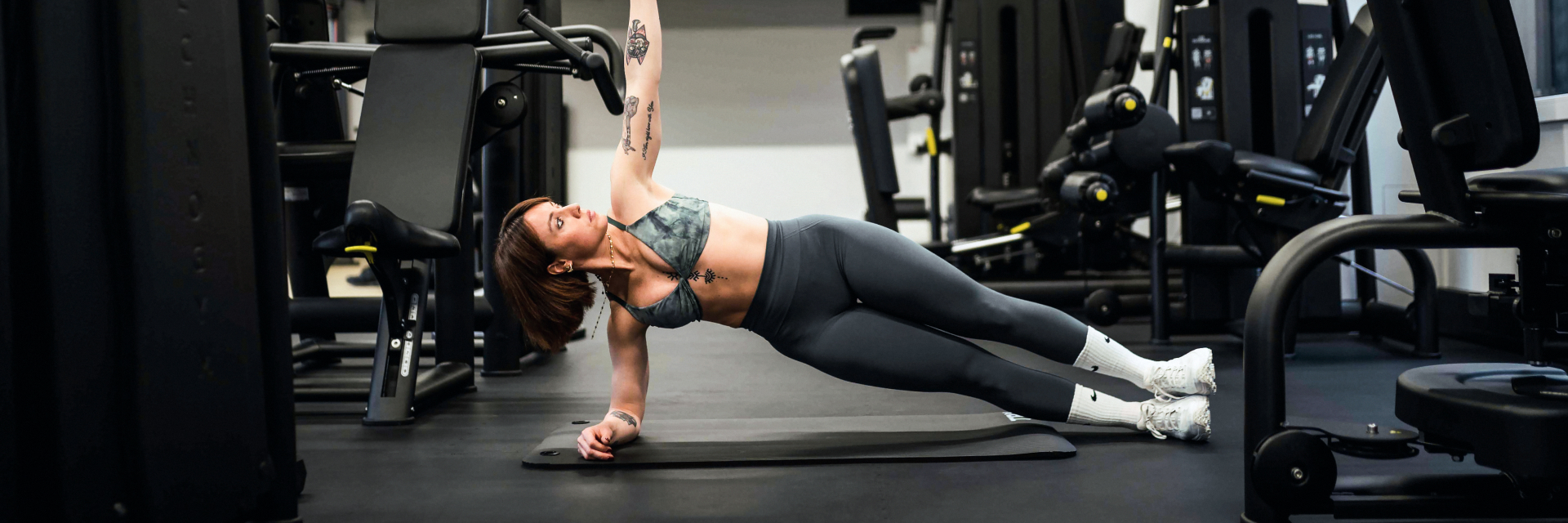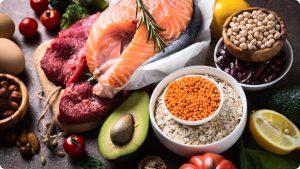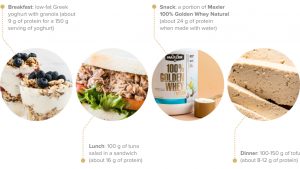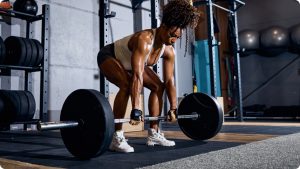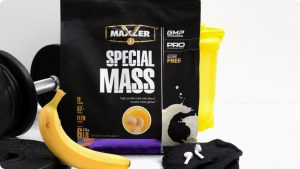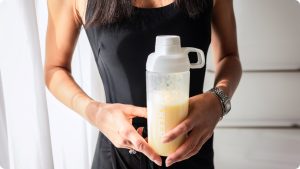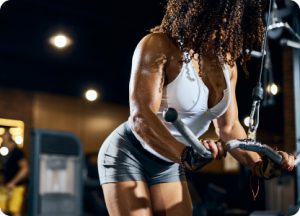A consumer study in 2019 showed that three-quarters of women in the UK never buy protein shakes. Women haven’t always had a straightforward relationship with protein, whether from whole foods or supplements. However, we now know plenty of benefits to a high-protein diet for men and women alike. Therefore, it’s time to break down the invisible wall and learn how to use protein for your goals.
In this post, we’ll help you get all the scoop on protein – what it is, how much to get and what good protein sources are.
What is protein?
Protein is a crucial macronutrient our body needs. If we take a look at it from a chemistry standpoint, protein is a chain of amino acids. Amino acids are small compounds the body can make or has to get from food. The ones we can’t produce and must obtain from other sources are called essential amino acids.
When we eat protein, for example, when having some beans for lunch, it goes into the gastrointestinal tract. There, it gets digested into amino acids and absorbed into the blood. As they travel around the body, cells take up the amino acids. Therefore, they can be used to make the proteins that make up our cell machinery. Alternatively, they can be used to make signalling molecules, such as neurotransmitters. The cells can even make non-protein products with them, such as creatine or an antioxidant called glutathione.
However, if we think about protein on a human body scale, we run into the concept of nitrogen balance. This is the combination of the protein you get daily from food and the protein that gets degraded and excreted as urea and ammonia. It’s essential to keep the nitrogen balance in balance, so to speak. You can do that by eating sufficient protein during the day.
Where may you get protein from in your diet? There are plenty of foods we consume daily that contain this nutrient. These foods include:
- Meats – lean meat like chicken breast is an excellent source of protein
- Fish – fish have lots of high-quality protein alongside beneficial omega-3s
- Dairy products – low-fat options, like low-fat Greek yoghurt, are fantastic protein sources
- Beans – legumes and beans are great sources of protein for those who can’t eat meat
- Nuts and nut butter – they can be an acceptable way to get some protein, but they tend to be rich in calories and fats, so use them wisely
- Tofu and soy products – soy is the only plant-based protein with all essential amino acids the body requires. Therefore, products that are made from soy, like tofu, are great options for protein intake
- For more high-protein foods, check out our post on which foods have a lot of protein.
Alongside whole foods, there is another way to get protein into your diet. Protein supplements, usually known as protein powders, make a great additional source of this macronutrient.
What are the risks of protein deficiency?
What happens if you don’t get sufficient protein? Getting enough to meet your daily requirements is very easy for most people. However, people in certain countries and of certain ages may have more difficulty meeting these requirements. In addition, certain medical conditions may put people at risk of not getting sufficient protein. In this case, it’s best to consult with a medical professional who can advise on the best way to meet protein goals.
However, if you’re curious about signs that you may not be getting sufficient protein, here they are:
- Nails and hair that is prone to being brittle or breakage
- Tiredness and hunger which can occur because protein helps keep us full
- Weakened immune system, which may result in being sick often
- A fluctuating mood, having a hard time thinking
- Weakness in the muscles
- Bone that may be more brittle or prone to fractures
All these occur when you do not meet your protein requirements over time. So, understanding how much protein you need and where to get it from is vital to your overall health.
Are women’s protein needs different from men’s?
Raise your hand if you think that men need more protein than women. While the thought might be familiar, it’s not entirely true.
The typical recommendations for protein consumption are the same for women and men regardless of age – it’s around 0.8 grams of protein per kilo of body weight. However, since the recommendations for intake are based on weight, and men tend to have more mass, they tend to need a bit more protein.
The picture is also made slightly more complicated by the menstrual cycle. It turns out that the monthly hormonal changes impact how our body processes the food we eat. In fact, after ovulation, our body uses more fat and protein at rest during the luteal phase. Therefore, women’s protein intake may have to be adjusted slightly to consider this, especially if you’re highly active.
What may a typical day that meets the requirements of daily protein for women look like?
It’s best practice to space out your protein intake evenly during the day, with about 25-30 grams of protein per meal. Suppose you are someone who weighs 70 kg and is trying to meet the protein requirements for women. You would need 56 grams of protein in a day. This can be achieved using the following:
- Breakfast: low-fat Greek yoghurt with granola (about 9 grams of protein for a 150 g serving of yoghurt)
- Lunch: 100 grams of tuna salad in a sandwich (about 16 grams of protein)
- Snack: a portion of Maxler 100% Golden Whey Natural (about 24 grams of protein when made with water)
- Dinner: 100-150 grams of tofu (about 8-12 grams of protein)
As you can see, it’s pretty easy to meet the requirements for protein intake for women mainly with whole foods.
When is protein recommended for girls?
Are there any times when a woman may need protein? The answer is yes, and it is all the time.
Every woman should aim to meet the recommended protein intake for women every day. This way, you can be sure that you’re supplying enough amino acids to your body to help you maintain your muscle tissue and hair.
However, there are other times when additional protein may be beneficial for women.
When building muscle mass. Protein is essential for making new muscle tissue and helping you grow muscle. If you’ve been meaning to become more toned, stronger, or even develop a bit of muscle, this nutrient is for you. Up your protein intake to 1.2-2.0 g per kg of mass for best results. Our blog on using protein to grow muscle can help answer many of your questions.
In addition, pair the protein with plenty of resistance exercise. It needs to be challenging enough to create a muscle response that will cause muscle growth.
Don’t be afraid of increasing your protein intake – it won’t make you bulky or suddenly turn you into the Hulk. Instead, it can support adequate muscle growth and recovery when paired with a strength training routine.
For tips on growing muscle as a woman, check out our post.
When leading an active lifestyle. Those who lead an active lifestyle can benefit from protein. This is especially true if you’re an athlete or someone who trains a lot or plays an amateur sport. Athletes and sports enthusiasts tend to have larger requirements for protein, as they need to support their bodies.
Look for sport-specific recommendations in daily protein for women for best results. You may find our nutrition plans a convenient place to learn more about nutrition for your sport.
But if you’re looking for a ballpark, the International Society of Sports Nutrition suggests increasing protein intake anywhere from 1.4-2.0 grams of the nutrient per kilo of weight.
When looking to recover well. Did you know that protein is essential for proper muscle recovery? During a challenging workout, whether it’s a class, a gym session or even a pilates routine, our muscles experience stress. Exercise-induced muscle damage brings on inflammation, which can affect how well we perform and cause soreness. Therefore, supporting muscle recovery is essential to get back to training effectively.
A large part of recovery lies in proper nutritional strategies. Consuming enough protein allows the muscles to repair themselves, lessening soreness and losses in strength and performance.
For a long time, we thought it essential to get a set amount of protein straight after a workout for the best recovery. However, now it appears that getting sufficient protein during the day is more important than the specific timing of protein intake. In addition, there may be no limit on how much protein you can have, with higher protein doses leading to more protein absorption.
However, recovery is not all about protein. For more tips on recovering well, check out these posts:
- Our top 3 recovery techniques for you to try
- What to do after working out to support recovery
- How to soothe DOMS or the soreness that develops within 48 hours after a workout
When trying to lose weight. Protein is an essential macronutrient for those who are trying to lose weight. That’s because protein can support the preservation of muscle mass. Athletes who are trying to lose weight are encouraged to eat up to grams of protein per kilo of weight to offset lean muscle loss. In addition, protein can help you stay fuller for longer. Therefore, protein is an essential part of the weight loss journey. Increasing protein intake can help you lose weight, sometimes even without exercise.
When trying to put on weight. Are you one of the people who, no matter how much you eat, just can’t seem to put on any weight? Protein can be a great addition to your routine if you’re in that boat. Protein can be a great way to put on lean muscle mass when combined with a calorie surplus and some exercise. This can help you healthily gain weight and keep the body toned.
An excellent option for those who want to increase their calorie and protein intake is mass gainers. Gainers, like Maxler Special Mass, are a combination of protein powder and carbohydrates, making them rich in calories and protein.
Want to learn more about gainers? Check out our blog posts on:
When preparing to age gracefully. Protein is a nutrient that those who want to age well should pay attention to. That’s because this macronutrient is necessary for muscle health and bone health. Muscle mass in older age is essential as it allows us to keep moving freely and retain independence for longer. In addition, it can be helpful for preventing frailty.
It appears that getting around 1.17 g of protein per kilo of body weight is enough to support older women. This amount ensures that you’re retaining functional muscle.
But preparing for healthy ageing doesn’t start when you’re already older. Consuming sufficient protein in midlife, especially protein from plant sources, is beneficial for healthy ageing.
Therefore, there are plenty of times when increasing the protein intake for women can be beneficial. It all depends on your goals and your lifestyle.
What types of protein are better for weight loss
Say your goal is to lose weight. In this case, you’d be looking to up your protein intake. However, a question arises – which protein sources are best for weight loss?
The general answer to that question is that the best type of protein for weight loss is low in calories and high in protein.
That means that if you’re relying on whole foods as your protein sources, seek lower-fat options. Choose meats that are lower in fat, and stick to lower-fat dairy products. Check which plant sources have more protein by mass for those on a plant diet. Some legumes can have more carbohydrates than protein, making them high in calories.
The key is to be able to make your protein sources fit into your diet plan.
If you need a lower-calorie and lower-fat source of protein, check out protein shakes for women. Whey protein isolates tend to have around 27 grams of protein per serving, with about 100 calories. This makes them a great protein source for those trying to lose weight.
Looking for more tips on how to select a protein for weight loss? Check out our post on the best protein powders for weight loss.
Is it possible to lose weight with protein without sport?
Losing weight is a common goal for many women and men. It’s often tempting to look for ways to make this process as easy on yourself as possible. Some people may seek out a magic pill or a diet to help them shed the pounds. But what if we told you that with a little bit of planning and some protein in your life, you’ll be able to lose weight successfully?
The basic rule of weight loss is that you have to eat fewer calories than you spend on a daily basis. This is called a calorie deficit. However, this poses a problem – you are likely to be hungry if you’re not getting the calories you’re used to.
This is where protein comes in. Protein is able to support our fullness queues. That’s because it raises the level of our fullness hormones. In addition, it decreases the levels of hormones that make us feel hungry.
Protein can be beneficial in your weight loss journey if you’re a snacker. That’s because those who tend to have more protein-rich foods think less about eating and snack less at night.
Protein powders for women during weight loss can come in handy. That’s because they make a convenient low-calorie snack when you need it. Alternatively, they can enrich a low-protein meal with the nutrient, helping you hit your protein goals and remain full. Protein for women is a great tool that can help you reach your goals no matter what they are.
If you’re looking for tips on how to lose weight, check out the following blog posts:
Ready to get started with using protein? Let’s talk about all the nitty-gritty of protein usage.
Ways to use protein
There are two types of protein products you might use on a daily basis. One is the protein you get from food sources. The other is a protein supplement, like a protein powder.
You probably already know how to use protein from whole foods. That may involve baking, boiling, or frying a piece of meat or some delicious tofu.
However, you may have questions about how to use protein powder.
First, understand the types of protein powders you may have available to you. Top protein powders for women include:
- Whey protein powder
- Casein protein powder
- Vegan protein powder
Whey protein for women is a high-quality source of amino acids from milk. It is quickly digestible and is typically lower in calories. A portion of whey protein without any unnecessary fillers will have around 100 calories.
Whey protein comes in the form of isolate, concentrate and hydrolysate. Isolates tend to have more protein and less fat by weight when compared to concentrates. Hydrolysates can be helpful if you need a quick boost of amino acids during or after a workout. You may also find protein blends, like Maxler 100% Golden Whey. These can contain multiple types of whey, making them a great option after recovery or as a snack.
It is simple to use whey protein powder for women. Simply add a scoop of protein powder to a shaker with water or milk. Shake to combine.
Alternatively, you can use whey protein to enrich foods with protein. For example, you can make this protein-rich breakfast glass recipe or a yoghurt and granola breakfast.
Casein protein powder is another milk-based protein. Casein takes longer to digest and, therefore, can keep you satiated. In addition, it’s great for those who need a long-term amino acid boost, such as overnight. Casein can be used similarly to whey. It makes a great protein shake.
You can also use casein for cooking. Baking healthy protein muffins or making a protein porridge are great uses for casein protein.
Vegan protein powders come in many shapes and sizes. Vegan protein is usually obtained from sources like soy, hemp, rice, and peas. Vegan protein powders typically have slightly less protein per serving and a different amino acid profile to milk-based protein powders. This may play an important role for those who want to maximise their muscle building, but it probably won’t matter much if you aim to get more protein.
Vegan protein powders can be used as a shake or for cooking.
Therefore, there are many ways to use protein powders.
There may be one last question you’ve not gotten an answer to yet. What is the best protein powder for women, and how do I find it? Many factors influence this answer, so let’s break it down:
- A good protein powder for women is one that you can easily incorporate into your routine. This means that it fits your nutritional wants and needs. For those who are trying to lose weight, a lower-calorie and higher-protein supplement may be preferable. For others, calories won’t make a difference. Therefore, first, understand your needs.
- Protein serving size is important. Some may need more protein in a scoop of protein powder because they have larger protein needs.
- Protein type plays a role. Whether you want a vegan protein or a whey protein will affect your choice of protein powder.
- Quality is key. Protein powders are nutritional supplements. Therefore, choose brands and producers who are open about their quality standards and ingredients. Maxler produces protein powders like Golden 7 Protein Blend in GMP and IFS-certified factories, adhering to high-quality standards.
- Don’t forget the taste. What’s more important than taste in being able to actually benefit from a protein powder? If you can’t drink it, you can’t get the protein. Therefore, try different flavors of protein powder. Maxler’s pride is the range of flavours our customers have raved about since the beginning.
By considering these factors, you’ll be able to find the best protein powder for you.
Protein is an essential nutrient that our body requires to upkeep muscle, make signalling molecules and keep us healthy. Women need to get enough protein, especially if you’re active or have a body composition goal. Choose a protein powder that will suit you to make sure you can maximise its benefits. Remember that proper nutrition can support your goals of becoming a better you!
